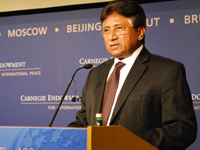Registration
You will receive an email confirming your registration.
Former president Pervez Musharraf addressed the history of U.S.–Pakistan relations, recent tensions between the two countries, and his vision for the way forward. The event was moderated by Carnegie's George Perkovich.
The Recent History of the Relationship
Perkovich began by noting that the importance of the U.S.-Pakistan relationship does not mean that it is an easy relationship. Currently, the relationship is full of tension – the United States has accused Pakistan of supporting anti-American insurgents, while Pakistan claims that the United States is a fair weather friend. Musharraf agreed, saying that the root causes of the current tension can be found in the recent past. He argued that Washington had made three crucial blunders:
- The Background: Musharraf said that when the Soviet Union invaded and occupied Afghanistan in 1979, it alarmed both Pakistan and the United States, pushing them closer together. Both decided to fight for Afghani independence by launching a jihad, or holy war, that would have support from across the Muslim world. As a result, the fight against the Soviet Union was spearheaded by religious leaders, and many of the fighters were Muslim foreigners.
- The First Blunder – Leaving Afghanistan: In the late 1980s, Washington abandoned the region over concerns regarding Pakistan’s nuclear program, which Musharraf argued qualifies as a Pakistani “existential requirement” and is a point of pride for the country. As a result of the American withdrawal, some mujahideen coalesced to form al-Qaeda, while others moved to Kashmir to fight India. Civil war raged in Afghanistan as multiple ethnicities fought each other.
- The Second Blunder – Refusing to Engage the Taliban: Eventually, the Taliban gained control of the country, but the United States refused to recognize them as the legitimate government. Musharraf said that in March 2000 he urged President Clinton to recognize the Taliban, set up missions within Afghanistan, and moderate the group from within.
- The Third Blunder – Not Empowering the Pashtuns: After the events of 9/11, the United States successfully invaded Afghanistan. But, Musharraf argued, they failed to follow up on that military victory with a political victory. The new government was not ethnically proportionate, and it disenfranchised the Pashtun population, roughly half of all Afghans. As a result, the Taliban and al-Qaeda – who had been pushed out of Afghanistan into Pakistan’s frontier areas – were able to capitalize on Pashtun discontent in Afghanistan and mount a resurgence that haunts the United States to this day.
The Situation Today
Musharraf argued that the present situation is extremely chaotic, with myriad regional and global terrorist groups coalescing in Pakistan and establishing new ties and networks. He stated that it was impossible for Pakistan to appease, let alone ally with, these groups, given that many Pakistanis had died by these terrorists’ hands. Furthermore, he added, the much-maligned Inter-Services Intelligence (ISI), Pakistan’s primary intelligence agency, has made many contributions to stopping new plots and to catching terrorists.
He described a number of ways that the U.S.-Pakistan relationship could be improved:
- Osama bin Laden: First, Pakistan must explain why Osama bin Laden had been found in Abbottabad, and whether it was a case of complicity or negligence. In either case, Musharraf said, someone should be punished. He added that he was “500 percent sure” that it was a case of “terrible negligence.”
- The Haqqani Network: Second, the Haqqani network is known to operate out of North Waziristan, and yet the Pakistan Army has failed to launch major military operations in the region. This has been a source of tension in Washington. Musharraf argued that the Pakistani government has yet to clarify the reasons for its reluctance to act against the Haqqani network.
- Withdrawal in 2014: Washington intends to withdraw its military forces from Afghanistan in 2014, Musharraf said, but it has yet to really show that Afghanistan will be stable by then. If it is not, Musharraf argued, Pakistan will be forced to take counter-measures, because Afghanistan’s internal chaos could have a direct impact in Pakistan.
- Stop Saying “Do More”: Musharraf stated that Washington keeps telling Pakistan to “do more” in the war on terror, but that Pakistan is already doing its best, and has lost many lives in the war. Such calls only anger the Pakistani government and its people.
The Future
Musharraf conceded that currently, Pakistan is in terrible shape. This instability is particularly puzzling in light of Pakistan’s tremendous resources and potential. He argued that the current crisis is a result of a leadership vacuum and of a failure in governance. He expressed his concern that if the 2013 elections do not deliver better leaders, then Pakistan will continue to slide downwards.
Musharraf concluded by saying that, as a result of Pakistan’s need for leadership, he has decided to re-enter politics. He argued that one key role he might play as Pakistan’s president would be to achieve peace with India, a cause that he greatly advanced during his time in office. He also defended his coup against Nawaz Sharif and his record as president, before concluding that he was the most pro-democratic leader Pakistan has had in many years.
